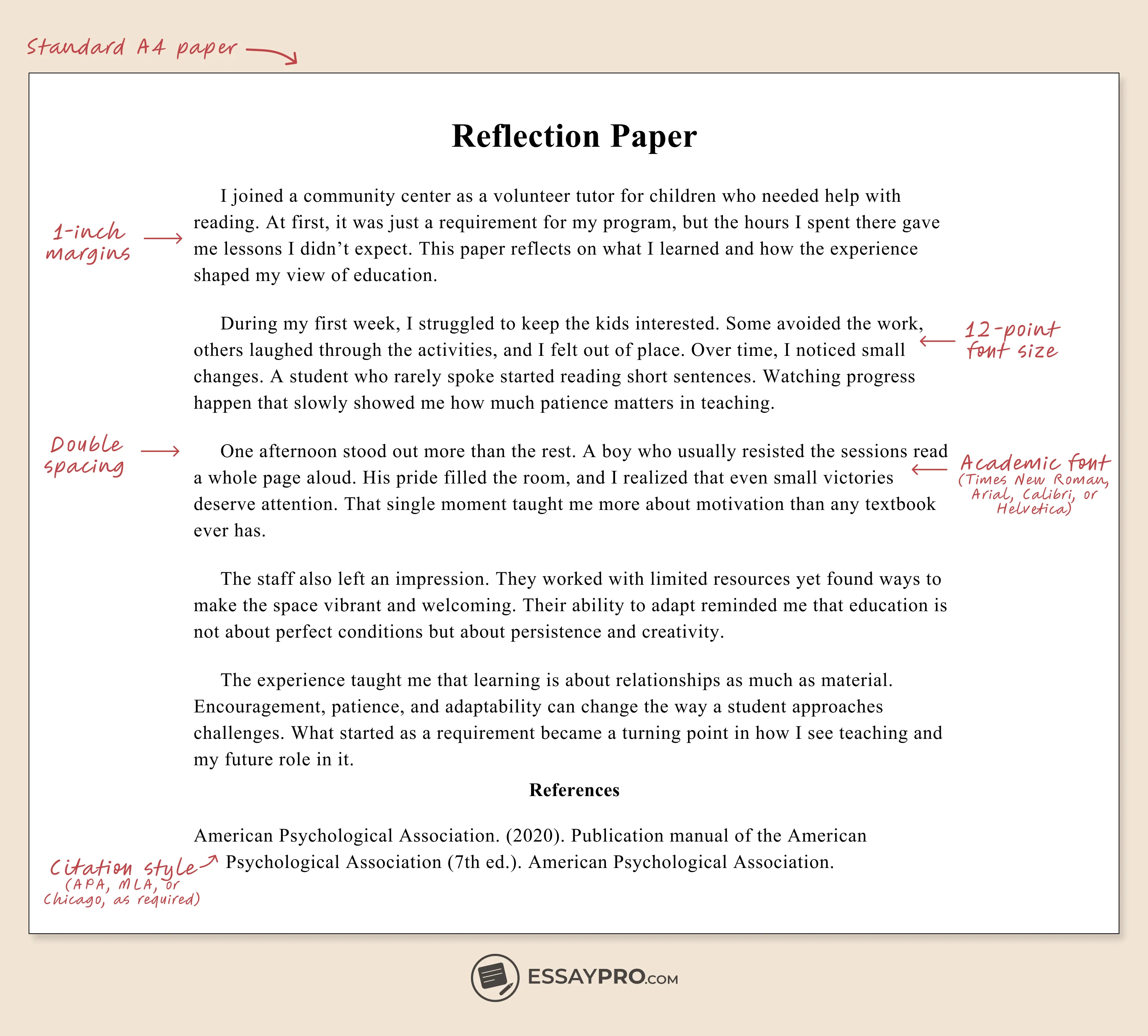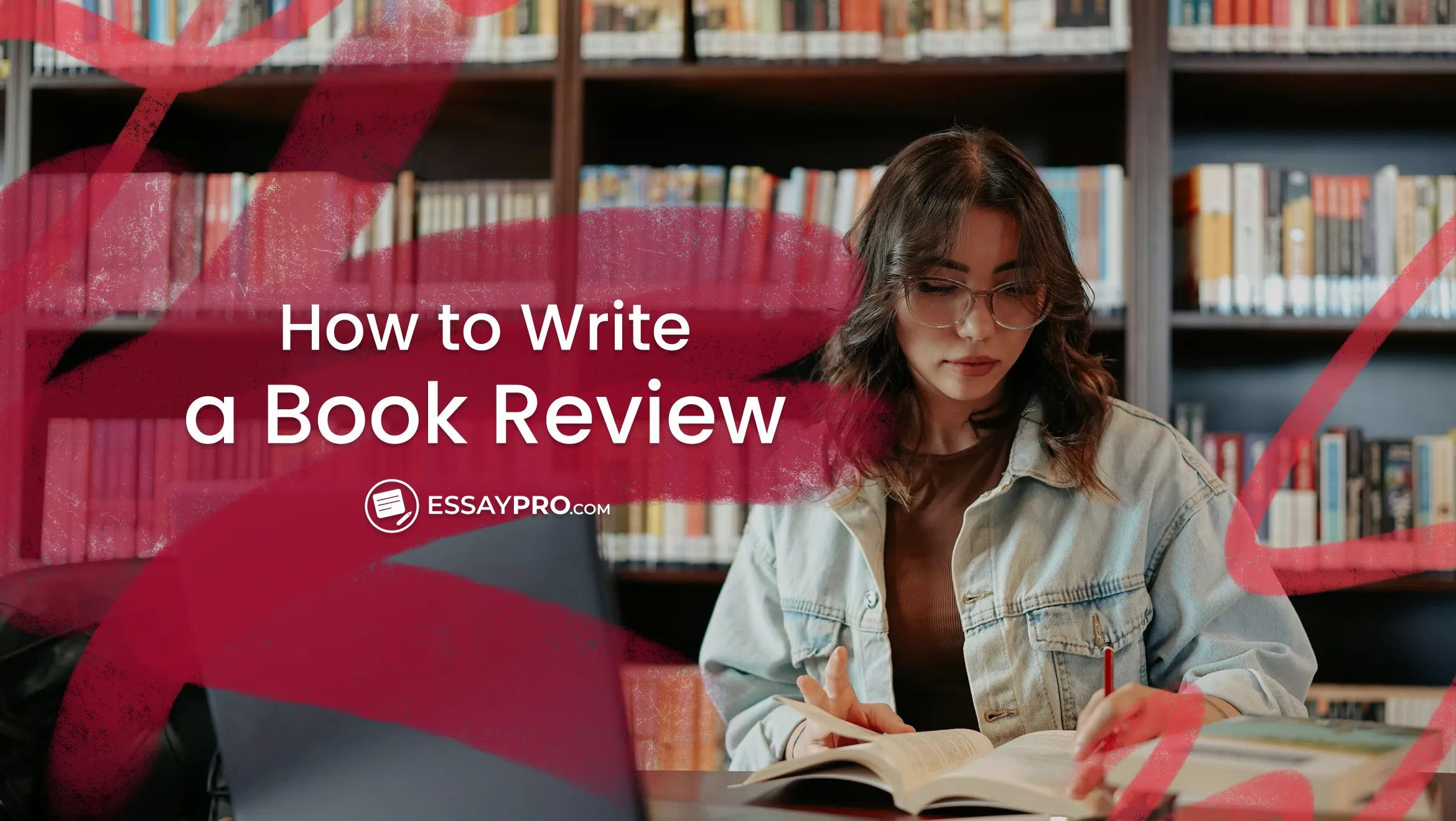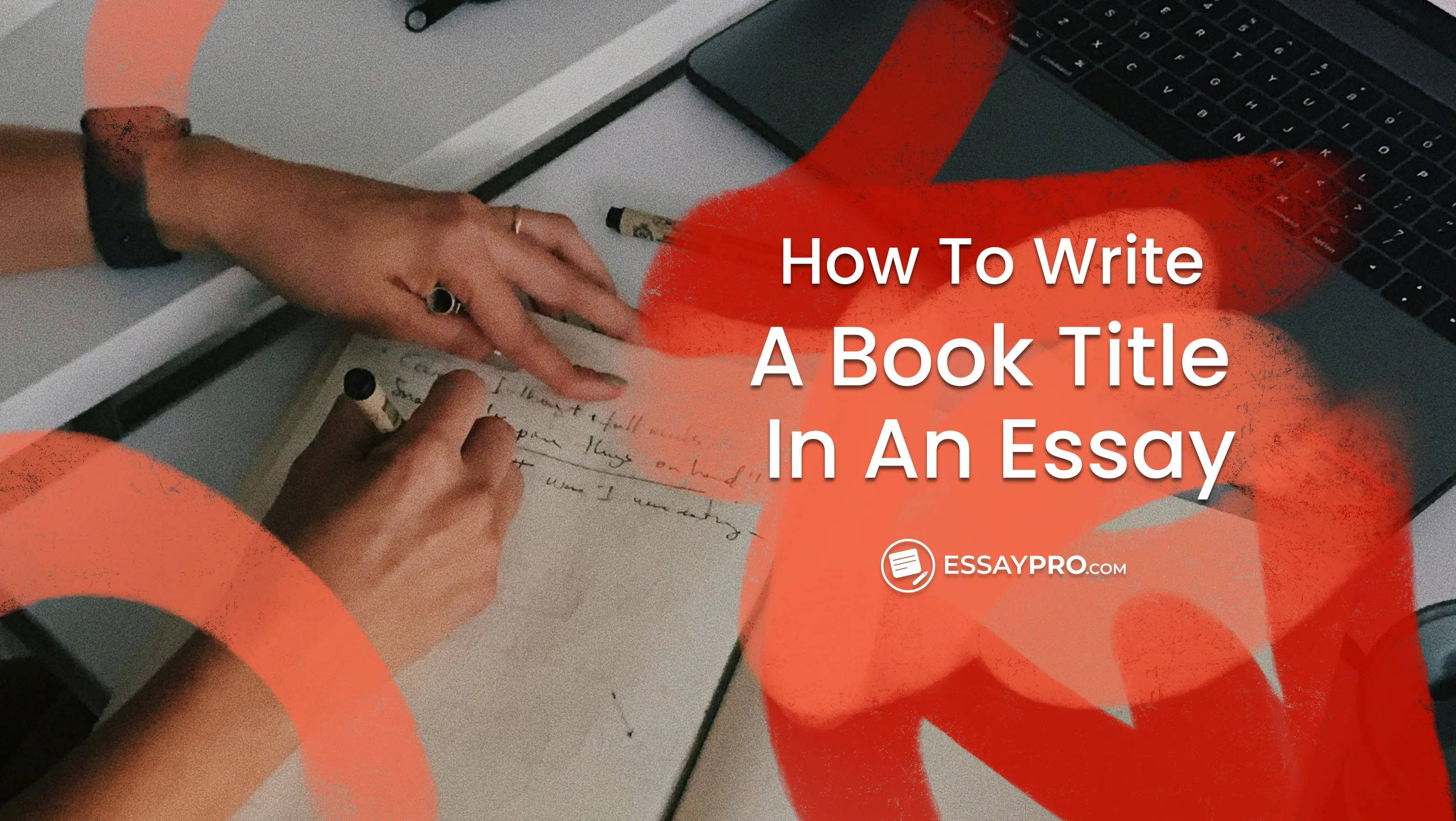A reflection paper is a short piece of writing where you analyze your own experience with something you've observed. You describe what happened and what it meant to you. Instead of only repeating facts, you connect them to personal insights. Many students find this style easier than formal essays because it allows for more honesty, though it still requires structure and clarity.
In this article, you'll see exactly what is a reflection paper, explore the main types, and review a clear reflection paper example. Along the way, you'll also learn practical tips you can use right away.
Types of Reflection Paper
Reflection papers fall into a few main categories. Each type shares the same rhythm: you recount what happened, then you interpret what it means to you. That simple pattern is what keeps a personal reflection paper clear and purposeful.
Here are a few most common types:
If you need additional guidance, platforms like EssayPro provide access to a research paper writing service where human writers can help shape your ideas into strong work.
💬 Got Any Unique Ideas on How to Start a Reflection Paper?
Jump into our EssayPro Community. We’ve got more real student discussions. Join, read, and share your ideas with others.
Sharing is caring 😊
Reflection Paper Video Guide
Our experts have created a video guide on how to write a reflection paper step-by-step:


How to Write a Reflection Paper
A reflection paper only works when you treat it as a process. You don't just sit down and type until you run out of words. You move through clear steps, paying attention to detail at each stage.
That's what keeps the writing focused instead of scattered.
How to Start a Reflection Paper
The best way to begin is to anchor your reader right away. Mention what exactly you're writing about. Then, say how it struck you. Go straight into your response instead of circling around the subject. If you're unsure how to dig into your first thoughts, ask yourself:
- Did this reading affect me in a meaningful way?
- Did it pull me in, or did I struggle to stay engaged?
- Was my perspective shifted, even slightly?
- Did it raise new questions?
- Were important issues left out?
- Does it connect to something else I've studied?
- Did I see it line up with ideas I already held?
Answering even two or three of those gives you enough material to begin shaping your introduction. Later, when you look at an example of reflection paper, you'll notice how naturally these questions flow into the writing. And if the start still feels heavy, EssayPro's reflection paper or even dissertation writing services can provide an extra push to turn your scattered thoughts into a sharper draft.
Draft an Outline
The outline is the skeleton of your reflection paper that keeps you from drifting. It's kind of your safety net. It shouldn't be long or detailed, but rather straightforward.
A simple reflection paper outline begins with an introduction that sets the subject and continues with body paragraphs. It should end with a conclusion that pulls everything together. That's it.
If you’re still unsure about what sections a reflection paper includes, don’t worry. We’ll cover all the important parts in more detail below.
Create a Main Theme
Every reflection needs a center. Without it, the writing reads like loose notes. Choose one idea that ties your paper together. Doesn't matter if it's a moment your beliefs shifted or a lesson you would never expect. Every other part will naturally bend toward your theme once you've got it.
Think of Ideas and Experiences for Critical Reflection
After setting your theme, jot down experiences, examples, or lessons that connect to it. Let them spill out, then sift through them later. Once you've gathered a few, pause and look closer. Why did this idea matter to me? What about this moment stayed in my memory? How does this connect back to the theme I chose?
Here's a model to help you learn how to write a good reflection paper:
- Plenty of students still cling to the idea that an all-nighter is the secret weapon for exam prep.
- The truth hit during the exam itself: my brain felt like fog, and I forgot answers I'd repeated a hundred times the night before. That collapse forced me to step back and question the method I thought worked.
- Later, I dug into studies on memory and sleep. Every page said the same thing in different ways: without rest, learning falls apart.
- I tried a new routine: shorter study sessions with breaks, and eight hours of sleep before the test.
- I noticed that peer pressure had played into my old habits. Friends wore their sleepless nights like badges of honor, and I followed, even when it left me drained.
- Now I hold a different view. A rested mind can do more in less time, and I've stopped treating exhaustion as proof of hard work.
To make it shorter, you can format your experience like this:
Idea: I used to believe that an all-nighter before an exam gave me an edge.
Analysis: More hours awake meant more pages covered, so it made sense. But once I stretched it too far, I noticed my head felt hollow when the exam started. Answers I had drilled into my brain slipped away. That failure forced me to look for answers outside my routine. Slowly, I shifted into shorter daily study sessions and let myself sleep the night before. Now I see sleep as part of studying, not the enemy of it.
Connect the Dots
Isolated thoughts don't make a paper; connected ones do. Let your opinions talk to each other. Here's how you can do it according to what you're reflecting on:
- Book: Gather details about the author and the storyline. Then, you can talk about how the themes and characters sparked a reaction in you.
- Course: Name the course and describe what it covered. Then go a step further: mention why you took it in the first place, and then explain what it left you with.
- Project: Lay out what went smoothly and where you struggled. Then connect the experience to something bigger.
If deadlines leave you pressed, you can always buy essay from EssayPro.
Write a Reflective Essay
When everything is in front of you (outline, theme, examples, connections), you can safely say you're ready to draft. Start dealing with essay one section at a time. A reflection paper consists of:
- Introduction: names the subject and hints at your theme.
Example: I picked up To Kill a Mockingbird expecting a story, but I walked away with questions about fairness and the way people treat one another.
- Body Paragraphs: expand on each point and weave in analysis as you go.
Example: Atticus Finch’s steady persistence during the trial made me rethink courage. Sometimes, all bravery looks like is choosing principles even when the outcome seems impossible.
- Conclusion: End with a final thought that circles back to your theme. State why the experience mattered.
Example: Closing the book almost felt like carrying a responsibility. Those pages nudged me to notice the quiet injustices around me and reminded me that even small choices in daily life reveal the kind of person I want to be.
Reflection Paper Format
The structure of a reflection paper follows the same academic rules you've likely used before. Here are the most important things about the format of reflection paper:
- Use standard A4 paper for printed submissions.
- Keep 1-inch margins on all four sides.
- Set your text to a 12-point size for readability.
- Choose a clear academic font such as Times New Roman, Arial, Calibri, or Helvetica.
- Apply double spacing throughout the paper to keep it easy on the eyes.
- Follow the citation style requested by your instructor (APA, MLA, or Chicago are the most common).

Reflection Paper Example
Here are three reflection paper examples so you can move from theory to practice:
Tips on Writing a Reflection Paper
A reflection paper only works when it feels intentional. The good news is that a few simple habits keep the writing grounded and easy to follow.
- Start with a thesis statement that tells the reader what your central idea is right away. It doesn't have to be long, but it should give direction.
- Keep the voice personal. Honesty matters here more than in almost any other type of academic writing.
- Bring in concrete moments instead of broad generalizations. Readers remember stories, not vague claims.
- Tie each point back to a lesson or a shift in perspective. That's where reflection shows its value.
- Map your structure before you write. Even a quick outline keeps the flow smooth.
When the words stall, there's no shame in asking us, 'Write my essay for me.'
The Bottom Line
Reflective writing asks you to incorporate your own analysis into a personal experience. You take something that happened, and add your own opinion to it. With the right steps, you can shape your thoughts into a paper that feels honest and sharp.
And if you ever feel like a little guidance would make the process easier, EssayPro offers the kind of support that turns scattered notes into a paper you're proud to hand in.
FAQ
How to Write a Reflection Paper?
Start by saying exactly what you're reflecting on. Don't just list it, explain how it hit you. Let the writing sound personal, but don't let it wander; give it shape. Bring in examples that show how your thinking shifted or deepened. When you reach the end, circle back and close with a conclusion that ties those threads into a single takeaway.
How to Start a Reflection Paper?
The beginning matters most. Mention the work or experience right away, then state your first reaction. Anchor your reader in the context and give a hint of your main theme. A short thesis statement works well here because it sets the direction for the entire paper.
How to Make a Good Reflection Paper?
A strong reflection paper feels both honest and organized. Use clear examples to back up your points, and explain why those examples matter to you. Connect your personal experience with larger lessons or future goals. When those pieces come together, the result is a paper that shows growth and insight.

Daniel Parker
is a seasoned educational writer focusing on scholarship guidance, research papers, and various forms of academic essays including reflective and narrative essays. His expertise also extends to detailed case studies. A scholar with a background in English Literature and Education, Daniel’s work on EssayPro blog aims to support students in achieving academic excellence and securing scholarships. His hobbies include reading classic literature and participating in academic forums.
- Critical Reflection | Writing and Communication Centre | University of Waterloo. (n.d.). https://uwaterloo.ca/writing-and-communication-centre/critical-reflection
- Research guides: Organizing your Social Sciences research assignments: Writing a reflective paper. (n.d.). https://libguides.usc.edu/writingguide/assignments/reflectionpaper
- Writing a Reflection Paper. (n.d.). https://www.lewisu.edu/writingcenter/pdf/WritingaReflectionPaper.pdf
- Critical Reflection - Purdue OWL® - Purdue University. (n.d.). https://owl.purdue.edu/owl/resources/community_engaged_writing/critical-reflection.html







